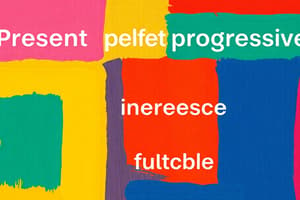Podcast
Questions and Answers
Which of the following correctly represents the future perfect tense?
Which of the following correctly represents the future perfect tense?
- I will complete the project by Friday.
- He is going to graduate next year.
- She has arrived by noon.
- They will have finished their homework by then. (correct)
What is a common mistake when using the future perfect tense?
What is a common mistake when using the future perfect tense?
- Incorrectly using 'will not' in negative forms.
- Omitting the time expression entirely.
- Including a specific time with the past participle.
- Using 'have' instead of 'will have' for future actions. (correct)
Which sentence appropriately uses the future perfect tense in a context of storytelling?
Which sentence appropriately uses the future perfect tense in a context of storytelling?
- By the time he arrives, we will have left. (correct)
- I will be reviewing documents after lunch.
- She will be arriving by noon.
- They completed the project yesterday.
Which option demonstrates the correct use of the future perfect in a planning discussion?
Which option demonstrates the correct use of the future perfect in a planning discussion?
How should the future perfect tense be used in a conditional sentence?
How should the future perfect tense be used in a conditional sentence?
Flashcards
Future Perfect Form
Future Perfect Form
Describes an action that will be completed before a specific time in the future.
Future Perfect Structure
Future Perfect Structure
"Will have + past participle"
Future Perfect Subject
Future Perfect Subject
Any pronoun or noun, indicating who will complete the action.
Future Perfect Time Marker
Future Perfect Time Marker
Signup and view all the flashcards
Future Perfect - Negative
Future Perfect - Negative
Signup and view all the flashcards
Future Perfect - Question
Future Perfect - Question
Signup and view all the flashcards
Common Mistake - Future Simple vs. Future Perfect
Common Mistake - Future Simple vs. Future Perfect
Signup and view all the flashcards
Common Mistake - Incorrect Time Expression
Common Mistake - Incorrect Time Expression
Signup and view all the flashcards
Common Mistake - Omitting "will" or "have"
Common Mistake - Omitting "will" or "have"
Signup and view all the flashcards
Context Application - Planning Discussions
Context Application - Planning Discussions
Signup and view all the flashcards
Future Perfect - Storytelling
Future Perfect - Storytelling
Signup and view all the flashcards
Future Perfect - Conditional Sentences
Future Perfect - Conditional Sentences
Signup and view all the flashcards
Future Conditions
Future Conditions
Signup and view all the flashcards
Future Perfect Tense
Future Perfect Tense
Signup and view all the flashcards
Time Specifications
Time Specifications
Signup and view all the flashcards
Past Participle
Past Participle
Signup and view all the flashcards
Future Perfect - Action Completion
Future Perfect - Action Completion
Signup and view all the flashcards
Planning Meetings
Planning Meetings
Signup and view all the flashcards
Conditional Sentences
Conditional Sentences
Signup and view all the flashcards
Specific Time
Specific Time
Signup and view all the flashcards
Study Notes
Future Perfect
Form Structure
- Structure: will have + past participle
- Example: "I will have completed the project by Friday."
- Subject + will + have + past participle
- Subject can be any personal pronoun or noun (e.g., he, they, the team).
- Negative Form: will not have + past participle
- Example: "She will not have arrived by noon."
- Interrogative Form: Will + subject + have + past participle?
- Example: "Will you have finished your homework by then?"
Common Mistakes
- Confusing future perfect with future simple or future continuous.
- Future perfect indicates completion by a specific time in the future.
- Incorrect use of time expressions:
- Common errors with "by" and "by the time," which should be used to indicate the deadline.
- Omitting "will" or "have":
- Mistake examples: "I have completed" instead of "I will have completed."
Contextual Application
- Used to describe actions that will be completed before a specific time or event in the future.
- Example: "By next year, I will have graduated."
- Often used in storytelling to indicate future conditions:
- Example: "When she arrives, we will have already left."
- Useful for setting expectations in planning discussions:
- Example: "We will have reviewed all documents by the meeting."
- Regularly appears in conditional sentences:
- Example: "If you save enough money, you will have bought a car by summer."
Future Perfect Tense
- Describes actions completed before a specific time in the future
- Structure: "will have + past participle"
- Example: "I will have completed the project by Friday."
- Subject + will + have + past participle
- Example: "She will have arrived by noon."
- Negative form: "will not have + past participle"
- Example: "She will not have arrived by noon."
- Interrogative Form: "Will + subject + have + past participle?"
- Example: "Will you have finished your homework by then?"
- Use "by" and "by the time" to indicate a deadline
- Avoid omitting "will" or "have"
- Example: "I have completed," instead of "I will have completed"
- Used to describe future conditions
- Example: "When she arrives, we will have already left."
- Used in planning discussions to set expectations
- Example: "We will have reviewed all documents by the meeting."
- Found in conditional sentences
- Example: "If you save enough money, you will have bought a car by summer."
Studying That Suits You
Use AI to generate personalized quizzes and flashcards to suit your learning preferences.




